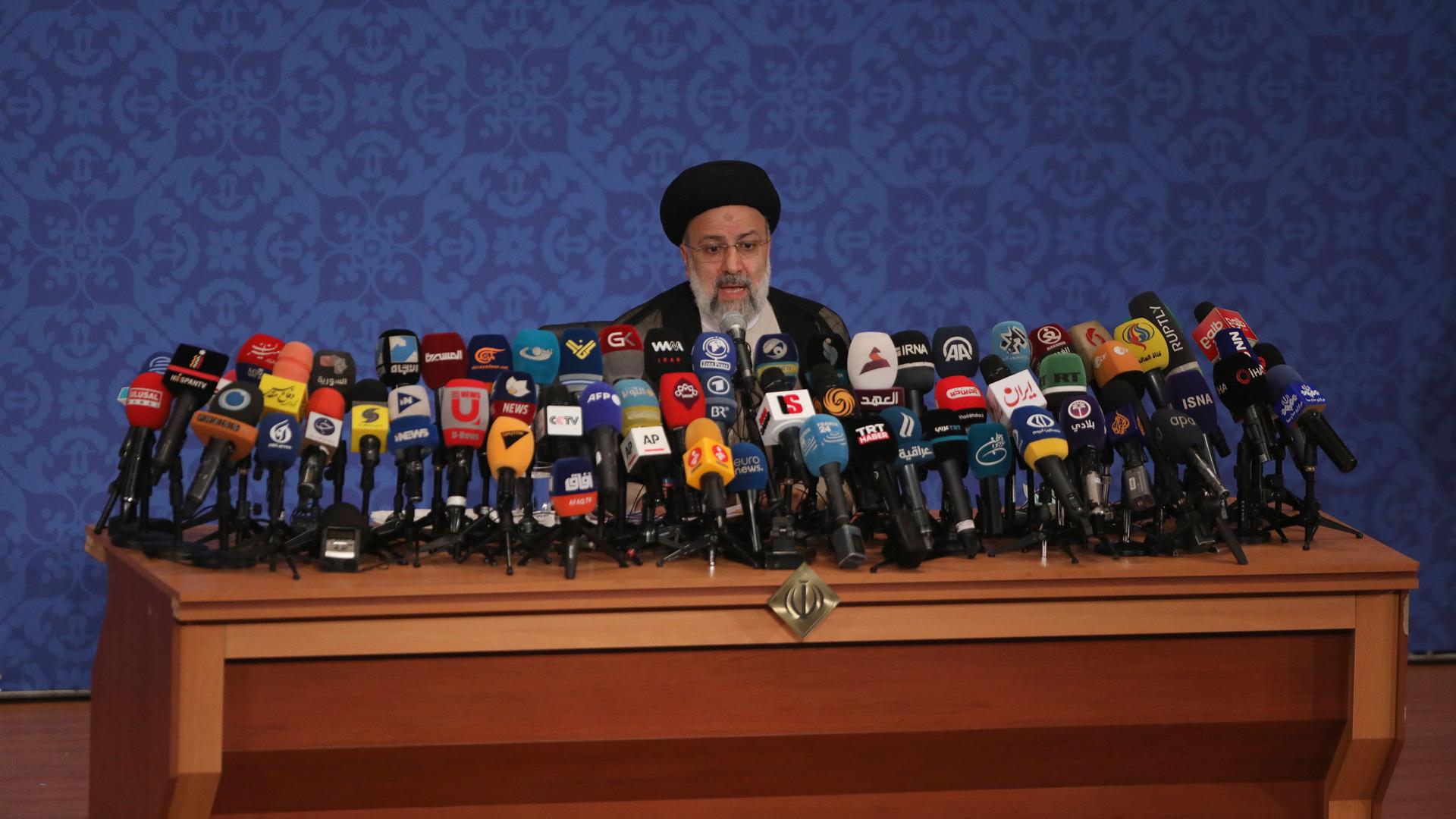Iran’s hard-line president-elect says he won’t meet Biden
Iran’s new President-elect Ebrahim Raisi speaks during a press conference in Tehran, Iran, June 21, 2021.
Sticking to a hard-line position following his landslide victory in last week’s election, Iran’s president-elect, Ebrahim Raisi, said Monday he would not meet with US President Joe Biden or negotiate over Tehran’s ballistic missile program and its support of regional militias.
Judiciary chief Ebrahim Raisi also described himself as a “defender of human rights” when asked about his involvement in the 1988 mass execution of about 5,000 people. It marked the first time he’s been put on the spot on live television over that dark moment in Iranian history at the end of the Iran-Iraq war.
“The US is obliged to lift all oppressive sanctions against Iran,” Raisi said at his first news conference after Friday’s election, a contest widely seen as a coronation after his strongest competition found themselves barred from running.
Raisi, 60, sat in front of a sea of microphones, most from Iran and countries home to militias supported by Tehran. He looked nervous at the beginning of his comments but slowly became more at ease over the hourlong news conference.
Asked about Iran’s ballistic missile program and its support of regional militias, Raisi described the issues as “nonnegotiable.”
Tehran’s fleet of attack aircraft date largely back to before the 1979 Islamic Revolution, forcing Iran to instead invest in missiles as a hedge against its regional Arab neighbors, who have bought billions of dollars in American military hardware over the years. Those missiles, with a self-imposed range limit of 2,000 kilometers (1,240 miles), can reach across the Mideast and US military bases in the region.
Iran also relies on militias like Yemen’s Houthi rebels and Lebanon’s militant Hezbollah group for counterbalance against enemies such as Saudi Arabia and Israel, respectively.
On a possible meeting with Biden, Raisi curtly answered: “No.” His moderate competitor in the election, Abdolnasser Hemmati, had suggested during campaigning that he might be willing to meet Biden.
The White House did not immediately respond to Raisi’s statements. Raisi will become the first serving Iranian president sanctioned by the US government even before entering office, in part over his time as the head of Iran’s internationally criticized judiciary.
The victory of Raisi, a protégé of Iran’s Supreme Leader Ayatollah Ali Khamenei, came amid the lowest voter turnout in the Islamic Republic’s history. Millions of Iranians stayed home in defiance of a vote they saw as tipped in Raisi’s favor after a panel under Khamenei disqualified prominent reformist candidates.
Of those who did vote, 3.7 million people either accidentally or intentionally voided their ballots, far beyond the amount seen in previous elections and suggesting some wanted none of the four candidates. In official results, Raisi won 17.9 million votes overall, nearly 62% of the total 28.9 million cast. Tehran had a 34% turnout, far lower than previous years, with many polling stations across the capital noticeably empty.
Raisi’s election puts hard-liners firmly in control across the government as negotiations in Vienna continue to try to save a tattered deal meant to limit Iran’s nuclear program.
Then-US President Donald Trump unilaterally withdraw America from the landmark agreement in 2018, setting in motion months of tensions across the region. In response, Iran has abandoned the limits of the deal and is now enriching uranium at 60%, its highest levels ever, though still short of weapons-grade levels. Representatives of the world powers party to the deal returned to their capitals for consultations following the latest round of negotiations on Sunday.
Raisi’s victory has raised concerns that it could complicate a possible return to the nuclear agreement. In his remarks Monday, Raisi called sanctions relief as “central to our foreign policy” and exhorted the US to “return and implement your commitments” in the deal.
“No matter the timing, a US-Iran agreement in Vienna leaves unanswered whether the United States can achieve a broader rapprochement with an Iran led by an avowed proponent of the core tenets of Iran’s Islamic Revolution,” the New York-based Soufan Center said in an analysis Monday.
On Sunday, Iran’s sole nuclear plant at Bushehr underwent an unexplained emergency shutdown. Previously, Iranian officials had warned that US sanctions affected their ability to get parts for the facility.
On Saudi Arabia, which has recently started secret talks with Iran in Baghdad over several points of contention between the regional heavyweights, Raisi said that Iran would have “no problem” with a possible reopening of the Saudi Embassy in Tehran and that the “restoration of relations faces no barrier.” The embassy was closed in 2016 as relations deteriorated.
Raisi struck a defiant tone, however, when asked about the 1988 executions, which saw sham retrials of political prisoners, militants and others that would become known as “death commissions.”
After Iran’s then-Supreme Leader Ayatollah Ruhollah Khomeini accepted a UN-brokered cease-fire, members of the Iranian opposition group Mujahedeen-e-Khalq, heavily armed by Saddam Hussein, stormed across the Iranian border from Iraq in a surprise attack. Iran ultimately blunted their assault.
The trials began around that time, with defendants asked to identify themselves. Those who responded “mujahedeen” were sent to their deaths, while others were questioned about their willingness to “clear minefields for the army of the Islamic Republic,” according to a 1990 Amnesty International report.
International rights groups estimate that as many as 5,000 people were executed. Raisi served on the commissions.
“I am proud of being a defender of human rights and of people’s security and comfort as a prosecutor wherever I was,” he said. “All actions I carried out during my office were always in the direction of defending human rights.”
He added: “Today in the presidential post, I feel obliged to defend human rights.”
By Isabel Debre and Jon Gambrell/AP
